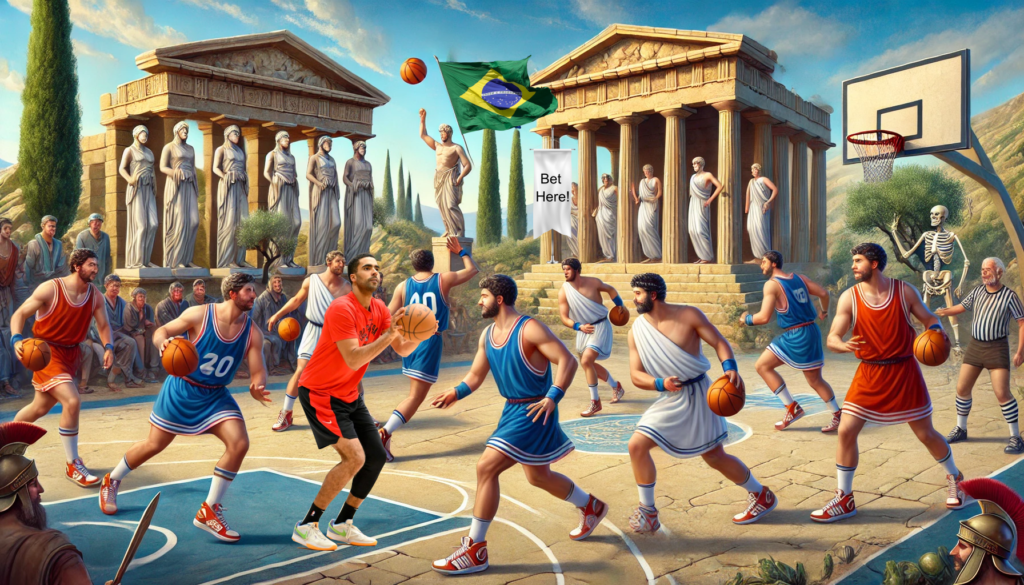In this week’s GME3 we have a long-awaited update to the rollout of Brazil’s new regulated gaming regime, a study by the Privacy Commissioner of Canada revealing distressing new data about how some platforms use deceptive design to part you from your data, and an attempt by former Toronto Raptor Jontay Porter to relocate his career to a more Mediterranean locale. Read on for the full stories!
Gambling
Brazil Bets on Clean Play
The Brazillian Ministry of Finance has released an ordinance detailing the anti-money laundering (AML) responsibilities that operators would be required to meet to obtain a gaming license.
The ministry based the ordinance, known as SPA/MF No 1,143, on internationally recognized guidelines related to the prevention of money laundering, financing of terrorism, and proliferation of weapons of mass destruction. Under the new rules, operators will have to adopt policies for identifying and classifying the risk level of customers who wish to register, as well as anyone involved in the process, including employees and suppliers.
The AML ordinance is step two of Brazil’s four-step plan to implement a licensed gaming regime by 2025. The first step, accomplished earlier in May, set out the technical, payment, and security requirements for licensees.
Unfortunately, Brazil seems to be falling behind schedule on the rollout of these phases. The technical ordinance that was released in May came out a full month after the ministry’s April deadline. Furthermore, these AML policies were supposed to be finalized in May, but are only coming out now. The next stages, including technical and security standards for online gaming and further details on gambling advertising, are also overdue.
Operators that are active in Brazil have until the end of 2024 to secure a license, but so far only two gambling operators – Superbet and Betano – have applied. With the 90-day priority application window ending next month that doesn’t leave a lot of time for more operators to apply. However, major stakeholders are still expecting a flood of applications once the regulatory requirements are finalized.
Media
Privacy Predicament: Tricky Tech Tactics
Last week the Privacy Commissioner of Canada and 25 privacy enforcement authorities from around the world released their findings from a study conducted earlier this year of more than 1,000 websites and mobile apps.
Based on the results of the study, privacy experts have concluded that deceptive design patterns that make it difficult for people to protect their privacy online are extremely prevalent, especially among apps or websites that are marketed toward younger audiences. A staggering 97% of platforms that were reviewed were found to be using one or more of these deceptive design patterns.
Some of these patterns include:
Using overly-complex language in privacy policies (89% of platforms);
Using emotionally charged language to influence user privacy decisions (42%);
Making the least privacy-protective option the default setting (57%);
Repeatedly asked users to reconsider their intention to delete their account (35%);
Making privacy settings difficult to find (40%); and
Forcing users to disclose more personal information when trying to delete their account than they had to provide when they created it (9%)
The study also focused on 67 websites and apps targeted at children. It was found that these sites used emotive language or nagging to manipulate users into making less privacy-friendly choices even more than sites targeted at the general population.
Privacy Commissioner of Canada Philippe Dufresne argues that this is the opposite of how it should be – young Canadians spend more and more time online every day, and the spaces that they visit should at least be safe. Commissioner Dufresne specifically recommends that these platforms “limit the collection of young people’s personal information, clearly explain privacy information, make privacy protective settings the default, and empower young people and their parents or guardians to make informed privacy protective choices.”
Ensuring online platforms prioritize transparent and user-friendly privacy practices, especially for younger audiences, is imperative for fostering a safer digital environment. If you have questions about your company’s privacy policies, reach out to us here at GME Law!
Entertainment
It’s All Greek to Him
Earlier this week former Toronto Raptor Jontay Porter filed a motion to get his passport back before sentencing in his NBA sports betting scandal.
The motion contained four requests:
For Jontay Porter to get his passport back;
to travel to and around Europe;
to live in Patras, Greece; and
to play pro basketball in Patras, Greece.
Porter has now pled guilty to felony charges and admitted to being part of an illicit gambling ring. While his sentencing isn’t scheduled until December 2024, federal prosecutors are seeking out a 41 to 51-month prison sentence in addition to the $450,000 he’ll owe in fines and fees.
In this week’s motion, Porter’s lawyer, Jeff Benson, argued that Porter wanted to “pursue a very fortunate – and quickly diminishing – opportunity to earn income through his primary skillset” adding that “such an opportunity is unlikely to arise again.”
Despite the fact that Porter would still be able to return to New York to meet his court obligations, as well as continue his court-mandated gambling addiction counselling, Judge LaShann DeArcy Hall denied the request.
GME Law is Jack Tadman, Zack Pearlstein, Lindsay Anderson, Daniel Trujillo, and Will Sarwer-Foner Androsoff. Jack’s practice has focused exclusively on gaming law since he was an articling student in 2010, acting for the usual players in the gaming and quasi-gaming space. Zack joined Jack in September 2022. In addition to collaborating with Jack, and with a keen interest in privacy law, Zack brings a practice focused on issues unique to social media, influencer marketing, and video gaming. Lindsay is the most recent addition to the team, bringing her experience as a negotiator and contracts attorney, specializing in commercial technology, SaaS services, and data privacy.
At our firm, we are enthusiastic about aiding players in the gaming space, including sports leagues, media companies, advertisers, and more. Our specialized knowledge in these industries allows us to provide tailored solutions to our clients’ unique legal needs. Reach out to us HERE or contact Jack directly at jack@gmelawyers.com if you want to learn more!
Check out some of our previous editions of the GME3 HERE and HERE, and be sure to follow us on LinkedIn to be notified of new posts, keep up to date with industry news, and more!




